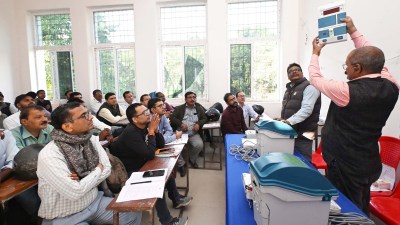Seville war promises to wipe out drugs-induced gloom
SEVILLE, Aug 20: Athletics, reeling after the recent series of drug scandals that sent shock waves through the sport, are looking to the ...

SEVILLE, Aug 20: Athletics, reeling after the recent series of drug scandals that sent shock waves through the sport, are looking to the 3Ms to restore its tarnished image, when the World Championships get under way tomorrow.
Few doubt that Marion Jones, Maurice Greene and Michael Johnson are capable of putting a golden smile back on the frowning face of athletics.
The 23-year-old Jones is targetting an unprecedented four golds — 100m, 200m, long jump and relay. Jones’ bid was boosted today with the withdrawal of two-time long jump World champion Heike Drechsler, who has failed to recover from a left calf injury.
“We began preparing for the World Championships in 1998. Our programme has been geared for this moment,” explained Jones, who begins the defence of her 100m title tomorrow.
She knows how important her performances will be for the sport she loves. “We have started the championships on a negative note. Hopefully our show on the track will overshadow all of this,” she admitted, even asDutch sprinter Troy Douglas tested positive today.
In a pre-event promo, Maurice Greene swaggered onto the stage like a rap star, flashbulbs popping all around him, basking in the fame that befits his status as the world’s fastest man.
Greene grabbed the microphone and delivered his message: “Beware of The Phenomenon.” Greene was referring to himself, using a nickname that summed up the spectacular impact he had on sprinting in the past three years, highlighted by his 100-metre world record of 9.79 seconds.
Now, Greene has his sights set on another prize: three gold medals at the World Championships.
The 25-year-old American is competing in the 100, 200 and 4×100 relay. Carl Lewis (1983, 1987) and Michael Johnson (1995) are the only male athletes to win three golds at a single Worlds.
Greene is seeking to become the first man to complete a 100-200 sprint double at the Worlds, and the first at any major championship since Carl Lewis won both events at the 1984 Olympics.
The 100m heats are onSaturday, with the semifinals and final on Sunday. The 200 heats start on Tuesday, with the semis on Wednesday and final on Friday.
“I’m just eager to get on the track and run,” Greene said yesterday. “They say the track is very fast. I just want to see how fast.”
Johnson, who is the only man to do the World and Olympic 200-400m double, has cut a surly figure round the European circuit this season but insists that even approaching 32 and bedevilled by niggling injuries he can still see off the best on the track.
Johnson said: “I feel back to the form I was in in 1996.” While the 3Ms may top the billing, the 7th World Athletics Championships offers a tempting menu.
Denmark’s 800m World record holder Wilson Kipketer has recovered from the malaria that laid him low, and although he has not yet matched the performances of 1997 when he finally smashed Seb Coe’s record, gold looks assured.
International Amateur Athletics Federation (IAAF) president Primo Nebiolo has vowed that the championships willovershadow the doping scandals that have harmed the sport.
“Athletics is in good shape and has an even more brilliant future,” he said. Eight days of competition will prove whether or not he is right.
IAAF to expose three more drug cheats?
SEVILLE, AUG 20: The spectre of drugs continues to haunt the International Amateur Athletic Federation (IAAF), just a day before the Seventh World Championships are due to begin here, with hints that there could be as many as three more positive doping cases still to be announced.
Following the recent high-profile positive drug tests on past world champions Linford Christie, Cuban Javier Sotomayor and Merlene Ottey, IAAF president Primo Nebiolo took on a beleagured look as he attempted to divert public attention away from the test tubes and on to the stop watch and measuring tape.
But in a barely coded message to the likes of Christie, Ottey and Sotomayor, the ageing Italian overlord of world athletics did issue a warning that all drug cheats would facepunishment — however big a star they might be.
Prof Arne Ljungqvist, a senior IAAF vice-president from Sweden, and a biochemist by profession, was wheeled into the president’s pre-championships press conference to field all questions relating to doping.
Ljungqvist denied there were any more positive drug case spending, though other senior sources within IAAF contradicted this, claiming the talk behind closed doors in IAAF’s secret session is that as many as three more athletes had failed drugs tests.
In his address to IAAF Congress, Nebiolo spoke about the continuing modernisation and professionalisation of athletics, “without abandoning our traditional ethical principles”.
“We have battled against doping and will continue to do so with intransigence and severity,” Nebiolo said in his address to the Congress, a meeting of representatives from the federation’s 210 member nations, gathered here ahead of the championships.
“Doping is a dangerous degeneracy, whose damage is spiritual as well aschemical. Nobody can give us lessons on this subject. We will continue this battle, hopefully in agreement with the rest of the sports world, for our principles and our right to govern our sport. We have the courage of our convictions in the anti-doping war, whoever is the subject,” he said.
The Congress decided to throw out an American proposal to change the doping rules by eliminating the preliminary suspension of athletes pending a disciplinary hearing.
Instead, against strong opposition from some countries, led by the United States and Britain, IAAF has opted to announce the names of all athletes who test positive immediately after the laboratory has confirmed its findings.
“In my experience, it is impossible to keep a doping case confidential for more than a few days,” Ljungqvist said. “We argued, successfully, that confidentiality of an accused athlete cannot be maintained — such a system of confidentiality reduces our credibility because when the news leaks out, we are unable to comment onthe case, we are almost forced to tell lies.
“So we have changed the rules in the interest of openness, and so that the correct information gets out.”
But a German proposal to start all world records afresh with the new millennium failed to win acceptance.



- 01
- 02
- 03
- 04
- 05




























